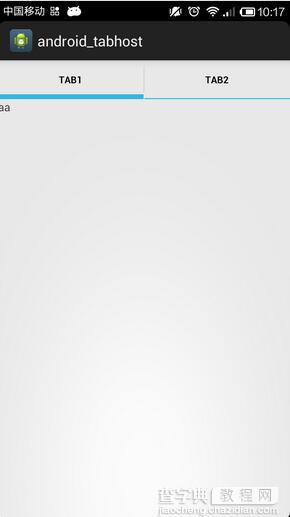TabHost组件可以在界面中存放多个选项卡, 很多软件都使用了改组件进行设计。
一、基础知识
TabWidget : 该组件就是TabHost标签页中上部 或者 下部的按钮, 可以点击按钮切换选项卡;
TabSpec : 代表了选项卡界面, 添加一个TabSpec即可添加到TabHost中;
-- 创建选项卡 : newTabSpec(String tag), 创建一个选项卡;
-- 添加选项卡 : addTab(tabSpec);
二、实例讲解
TabHost的基本使用,主要是layout的声明要使用特定的id号,然后activity继承TabActivity即可。
main.xml:
<TabHost xmlns:android="http://schemas.android.com/apk/res/android" xmlns:tools="http://schemas.android.com/tools" android:id="@android:id/tabhost" android:layout_width="match_parent" android:layout_height="match_parent" tools:context=".Main" > <LinearLayout android:layout_width="match_parent" android:layout_height="match_parent" android:orientation="vertical" > <TabWidget android:id="@android:id/tabs" android:layout_width="match_parent" android:layout_height="wrap_content" > </TabWidget> <FrameLayout android:id="@android:id/tabcontent" android:layout_width="match_parent" android:layout_height="wrap_content" > <LinearLayout android:id="@+id/tab1" android:layout_width="match_parent" android:layout_height="wrap_content" android:orientation="vertical" > <TextView android:layout_width="match_parent" android:layout_height="match_parent" android:text="aa" /> </LinearLayout> <LinearLayout android:id="@+id/tab2" android:layout_width="match_parent" android:layout_height="wrap_content" android:orientation="vertical" > <TextView android:layout_width="match_parent" android:layout_height="match_parent" android:text="bb" /> </LinearLayout> </FrameLayout> </LinearLayout> </TabHost>
Main.java:
package com.app.main; import android.app.TabActivity; import android.os.Bundle; import android.view.View; import android.view.View.OnClickListener; import android.widget.TabHost; import android.widget.TabHost.OnTabChangeListener; import android.widget.TabHost.TabSpec; import android.widget.TabWidget; public class Main extends TabActivity { @Override protected void onCreate(Bundle savedInstanceState) { super.onCreate(savedInstanceState); setContentView(R.layout.main); final TabHost tabHost = this.getTabHost(); TabSpec tab1 = tabHost.newTabSpec("tab1").setIndicator("tab1") .setContent(R.id.tab1); tabHost.addTab(tab1); TabSpec tab2 = tabHost.newTabSpec("tab2").setIndicator("tab2") .setContent(R.id.tab2); tabHost.addTab(tab2); } }
实现效果:

其他:
当点击tabwidget的时候,若想注册事件监听器,可以使用:
1.调用
tabHost.setOnTabChangedListener(new TabChangeListener(){ public void onTabChanged(String id) { } });
这个传入的id,就是tabwidget的indicator,这里是"tab1","tab2";
2.调用
tabWidget.getChildAt(0).setOnClickListener(new OnClickListener(){ });
以上就是本文的全部内容,希望能给大家一个参考,也希望大家多多支持查字典教程网。


